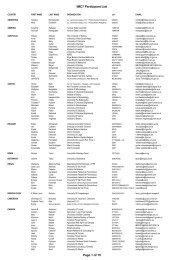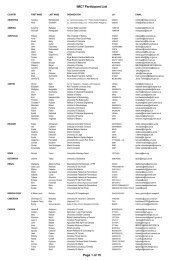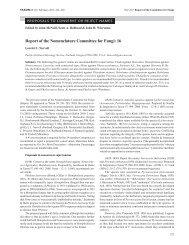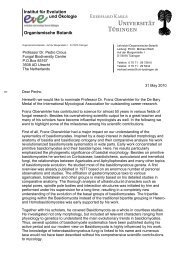Access Resource - Global Biodiversity Information Facility
Access Resource - Global Biodiversity Information Facility
Access Resource - Global Biodiversity Information Facility
You also want an ePaper? Increase the reach of your titles
YUMPU automatically turns print PDFs into web optimized ePapers that Google loves.
169 The naming of organisms (and plant communities)<br />
effected by (a) submitting the published matter that includes the<br />
protologue(s) or nomenclatural acts to a registering office<br />
designated by the relevant international body, or (b) where an<br />
official medium for establishment of names has been designated, by<br />
publication in that medium. (3) (bot., obsol.) the sending of printed<br />
matter that includes the protologue(s), with the name(s) to be<br />
registered clearly identified, to any registering office designated by<br />
the IAPT; this provision, included in the 1994 Toyko Code was<br />
deleted from the St Louis Code of 2000; cfr Validation List. (4)<br />
(phyl.) submission of the name and other required information to the<br />
PhyloCode registration database. (5) (zool., prop.) of names and<br />
nomenclatural acts, inclusion in the Official Register of Zoological<br />
Nomenclature (q.v.), and required for a new scientific name to be<br />
published in an electronic work; see electronic publication.<br />
registration number: (zool., prop.) a unique identifying number or alphanumeric<br />
code assigned in the Official Register (q.v.) to a particular<br />
item.<br />
-regnanoj: (unoff.) proposed termination in Esperanto for a name in the<br />
rank of kingdom in the New Biological Nomenclature (q.v.).<br />
Reihe: (bot., obsol.) a name of a rank taken as being in that of order.<br />
reinstate: of a name, to restore one previously rejected as being a<br />
secondary homonym or for some other reason once rejected, when<br />
certain conditions are fulfilled.<br />
reject: (1) (zool.) to set aside, in accord with the provisions of the Code; in<br />
the case of a name, because of taxonomic judgement; in the case of<br />
a work, for the purposes of zoological nomenclature. (2) to set aside<br />
a name of a taxon in favour of another name; see rejected name,<br />
rejected work, suppression.<br />
rejected name, [nomen rejiciendum, nomen rejectum, nom. rej.]: (1)<br />
(bot., prok.) a name the use of which is prohibited, either by formal<br />
action overriding other provisions of the Code; i.e. a name that<br />
would otherwise cause a disadvantageous nomenclatural change;<br />
names so ruled are placed on a list of such names which, and all<br />
combinations based on them, are not to be used; the placement of<br />
names on such a list must be ratified by an International<br />
Bacteriological or Botanical Congress; see conserved name. (2)









